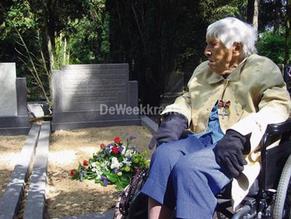|
World Jewish News

96-year-old Atie Ridder-Visser confessed to shooting Felix Gulje, an engineer, on March 1, 1946 in the university town of Leiden. Only to find out years later her victim was in fact saving Jews from Nazi persecution.
|
WWII Dutch resistance worker admits 65-year murder
12.06.2011, Holocaust An elderly former Dutch resistance worker confessed to murdering a suspected collaborator 65 years ago, only to find out years later her victim was in fact saving Jews from Nazi persecution, authorities said Thursday.
"At the beginning of the year I received a letter. It was written by a 96-year-old lady, almost 97, who admitted to murdering Felix Gulje in 1946," said Leiden mayor Henri Lenferink in a press release published on the town's website.
Atie Ridder-Visser confessed to shooting Gulje, an engineer, on March 1, 1946 in the university town of Leiden some 40 kilometres (25 miles) southwest of Amsterdam. His murder was never solved, Lenferink said.
Ridder-Visser, who later received a medal for her work in the Dutch resistance, at the time suspected Gulje of having collaborated with the Nazis who overran the lowlands country in May 1940.
Gulje supposedly repaired a bridge which the resistance had earlier destroyed, Lenferink said.
It was later proved that Gulje in fact helped Jews escape Nazi persecution, he said.
"The murdered Mr Gulje sheltered Jewish refugees under his roof in World War II. He also financially assisted other families helping refugees," Lenferink said, adding that Gulje was part of a banned Catholic workers' organisation.
"She (Ridder-Visser) said to me: 'If I had known, I certainly would not have done it. We did it based on the information we had at the time'," Lenferink told Dutch public television NOS.
"She said: 'In view of the information we had, we thought it to be natural to do it'," the Leiden mayor added, saying Ridder-Visser could not be prosecuted as the case was closed according to Dutch law, in March 1964, 18 years after it was committed
But Lenferink added: "I would like to say that in my view, even 65 years
later this murder should be strongly condemned."
"It was a case of own initiative and not acceptable. The action was not based on facts, but on wrong information," he said.
EJP
|
|
